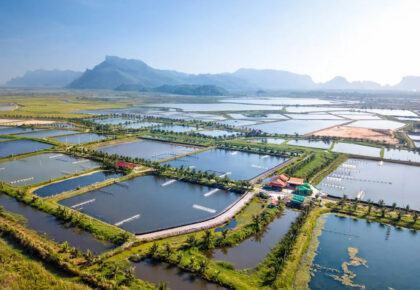
In recent years, the concept of regenerative agriculture has gained considerable attention as a promising approach for addressing the environmental challenges associated with conventional farming practices. By focusing on the restoration and enhancement of ecological processes, regenerative agriculture aims to create resilient and sustainable farming systems that not only ensure food security but also promote environmental stewardship. As stated by Craig Astill, CEO of the Caason Group, Australia, during a recent agriculture forum: “Regenerative agriculture is our pathway to a more thriving, resilient, and regenerative future for generations to come.“
A research study published in Science Advances has provided compelling evidence of the positive impact of regenerative practices on soil health. The study revealed that regenerative agriculture techniques can increase soil organic matter by 8% to 15% compared to conventional methods. This increase in organic matter is significant as it improves soil structure and enhances water retention capacity. Healthy soils with high organic matter content have the ability to store more water, reducing the risk of drought stress for crops and providing a buffer against unpredictable weather patterns associated with climate change. Additionally, improved water retention can help mitigate the impact of heavy rainfall by preventing soil erosion and nutrient runoff, thereby safeguarding water quality and preserving aquatic ecosystems.
Moreover, regenerative agriculture practices promote nutrient cycling within the soil ecosystem. By emphasizing the use of cover crops, crop rotation, and composting, regenerative farmers encourage the natural replenishment of nutrients in the soil. This approach reduces the reliance on synthetic fertilizers and minimizes nutrient runoff into water bodies, which can contribute to harmful algal blooms and aquatic ecosystem degradation. The cycling of nutrients through regenerative practices enhances soil fertility and ensures a continuous supply of essential elements for crop growth, ultimately leading to healthier and more productive farming systems.
Furthermore, regenerative agriculture has demonstrated its potential in carbon sequestration, thereby combating climate change. The same Science Advances study revealed that regenerative practices can enhance carbon storage in the soil. Through the promotion of cover crops and the reduction of tillage, regenerative farmers enable the sequestration of atmospheric carbon dioxide into the soil, helping to mitigate greenhouse gas emissions. The increased organic matter content in the soil serves as a long-term carbon sink, reducing the carbon footprint of agricultural activities. By harnessing the power of regenerative practices, farmers can actively contribute to climate change mitigation efforts while producing food sustainably.
In addition to the benefits to soil health and climate change mitigation, regenerative agriculture also fosters biodiversity and ecosystem resilience. A study published in Nature Sustainability highlighted the positive impact of regenerative systems on the abundance and diversity of beneficial insects, birds, and soil microorganisms. By incorporating diversified crop rotations and integrated pest management practices, regenerative farmers create habitats and food sources for a wide range of beneficial organisms. These organisms contribute to natural pest control, pollination, and nutrient cycling, thus reducing the reliance on synthetic pesticides and fertilizers. The resulting balance in the ecosystem promotes a healthier and more resilient farming system that can better withstand pest outbreaks and adapt to changing environmental conditions.
Reviving traditional farming practices is a fundamental aspect of regenerative agriculture. Many traditional farming methods, such as agroforestry, intercropping, and terracing, have long been practiced by indigenous communities around the world. These practices have proven to be sustainable and effective in preserving soil fertility, conserving water resources, and promoting biodiversity. By integrating traditional knowledge with modern scientific advancements, regenerative agriculture embraces the wisdom of the past and combines it with innovative techniques to develop farming systems that are both productive and environmentally friendly.
The shift towards regenerative agriculture requires not only the adoption of new practices but also a shift in mindset and policy support. Farmers need access to training, technical assistance, and financial incentives to transition from conventional to regenerative practices. Governments and policymakers play a crucial role in creating and enabling positive environment changes through supportive policies, funding for research and development, and the provision of infrastructure for market access. Additionally, consumers have a vital role to play by demanding sustainably produced food and supporting farmers who practice regenerative agriculture.
In conclusion, regenerative agriculture offers a promising pathway toward sustainable crop production and environmental stewardship. The research study published in Science Advances demonstrated the potential of regenerative practices to improve soil health, enhance water retention, and sequester carbon. Furthermore, the study published in Nature Sustainability highlighted the positive impact of regenerative systems on biodiversity and ecosystem resilience. By reviving traditional farming practices and incorporating them into modern agricultural systems, regenerative agriculture provides a holistic approach that addresses the pressing challenges faced by our current food production systems. As we strive for a more sustainable future, embracing regenerative agriculture can help us create resilient farming systems that nourish both people and the planet. By working collaboratively and investing in regenerative practices, we can pave the way for a more sustainable and prosperous future in agriculture.
With growing recognition of the importance of regenerative agriculture and its potential to address the environmental challenges of conventional farming, the upcoming 135th PIFW: “Feeding the World: Investing in Agricultural Innovation and Sustainability,” is set to delve into this topic and other pressing issues of the agriculture sector. At this highly anticipated event, investment experts and agriculture industry leaders will come together to explore innovative solutions and discuss the critical role of regenerative agriculture in ensuring a sustainable future for our global food system. In order to participate, be sure to register for the event.











